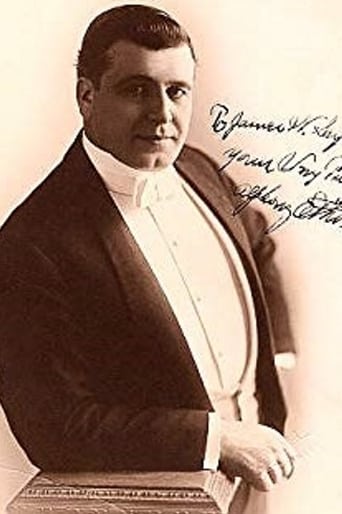VividSimon
Simply Perfect
Lucybespro
It is a performances centric movie
Humaira Grant
It’s not bad or unwatchable but despite the amplitude of the spectacle, the end result is underwhelming.
Rosie Searle
It's the kind of movie you'll want to see a second time with someone who hasn't seen it yet, to remember what it was like to watch it for the first time.
skylarmoffat
Before reading any reviews on this movie I was shocked to see what it turned out to be. A modern day R rated film. A young girl being pimped out by her father, one day turns the tables to become an powerful woman sleeping her way to the top, getting jewels, and not taking the easy way out along the way.
Antonius Block
There are several things that make this salacious pre-Code film worth watching, starting with Barbara Stanwyck, of course, who with her eyes and sexy come-on's seduces man after man to get ahead, literally f'ing her way to the top. There are some fantastic scenes from the beginning, where she fends off the advances of one man at her father's bar by pouring coffee on his hand, and explodes with anger at her father for essentially pimping her out since the age of 14. It's when he perishes in a fire that she has to fend for herself in the world. I'm not a big fan of John Wayne, but for those who are, you'll see him in an early role as one of her men along the way, and it was great to see Theresa Harris, who plays her maid. Lastly, I liked the elements of Nietzschean philosophy that at least form a basis for, and perhaps attempt to justify, Stanwyck using sex to get what she needs and wants out of men.On the other hand, the film is quite cynical and pretty linear in its plot. Stanwyck simply screws man after man – starting with a railroad worker who catches her hitching a ride to New York, and ending with an executive in a skyscraper. The film is brazen about this, and at one point she has sex in the ladies room, so if you're looking for elements of romance, this is not your film. How interesting is it that these "gold digger" themes are so common in films of this period, with men "victimized", when the far more prevalent situation in offices is sexual harassment, the inverse. While Stanwyck is one of my favorite actresses of the period, and it was exciting to see her in this steamy role, with those "take me" eyes and slow lead-ins to kisses, it's really rather hard to like any of the characters. The ending was a lame effort to patch some of that up, and didn't work for me. There are several Barbara Stanwyck pre-code films I would recommend over this one, including Night Nurse (1931), Ladies They Talk About (1933), and The Purchase Price (1932). If you're looking for high-wattage pre-Code shock value, though, this one is hard to top.
DaxBeach2.0
First off, I loved learning that this was originally a Vitaphione film, while those were still (barely) used by 1933. As we learned on the early technologies of film sound/audio, it was fun to realize this was one of those rare films that implemented the Vitaphone technology. So, if you have a bit of a crush on Barbara Stanwyck, you might get your guts ripped out from this film, because she is areal floozy, and quite the bedroom-cash-register -- all just to get her way with men. Her character of Lily, is a real rotten soul - but it's a fun movie to get through, to see how it progresses. She basically sleeps her way to success and wealth, from the lowliest bars/speakeasies, and all the way up to the top management of a bank. Sadly, Stanwyck's younger years as kid and teen weren't too far off from this portrayal, sans the prostitution. She grew-up rough, so I'm certain she was comfortable and at least knowledgeable enough to take on this role.
classicsoncall
You so often hear of actors and actresses refraining from certain roles for fear of being typecast, so I was a little surprised to see Barbara Stanwyck here as a young woman who starts out as an unwilling prostitute for her father (Robert Barrat), and then taking on the role full time in order to break out of poverty and assert herself in the world. Of course she might not have considered herself a prostitute, but a rose by any other name? Though Lily Powers (Stanwyck) sleeps her way to the upper echelon of the Gotham Trust Company, as the viewer I think one needs to keep a certain suspension of disbelief in mind. Her first victim Stevens (Donald Cook) was engaged to the President's daughter, and the heel worked to cover it up! Then, when Carter (Henry Kolker) moves in on Lily himself, he winds up dead at the hand of Stevens in a murder/suicide! Not saying it couldn't have happened that way, but it's a bit of a stretch to my thinking.What I thought was pretty clever was Courtland Trenholm (George Brent) pulling a fast one on his Board and Lily both by banishing her to Paris instead of paying an outright bribe to get rid of her. Of course that simply set up another round of career climbing for Lily that Trenholm needn't have got caught up in, but as the saying goes, love is blind.I'm pretty much in agreement with the viewers on this board who felt the film makers copped out a bit with the resolution of the story. Lily's change of heart was too abrupt to suddenly 'see the light' concerning her past indiscretions. But even more so I question the whole business of the Gotham Trust going under. For what reason - a scandal? And Trenholm indicted - for what? None of that was made clear at all and added to my confusion over the ending. I could see Trenholm attempting suicide given the circumstances, but what created the circumstances (at least those of a financial nature)? As far as losing Lily, OK, but there's that love is blind angle again. And if he really wanted to kill himself, he could have aimed a little higher.Even with those disclaimers though, I think this is a film one should see to get past the idea that themes like the ones shown aren't merely the product of more modern times. Movies made today might be more gritty in the presentation, but sometimes what's not shown on screen can be more visceral when left to the imagination, and this story leaves a lot to the imagination.







